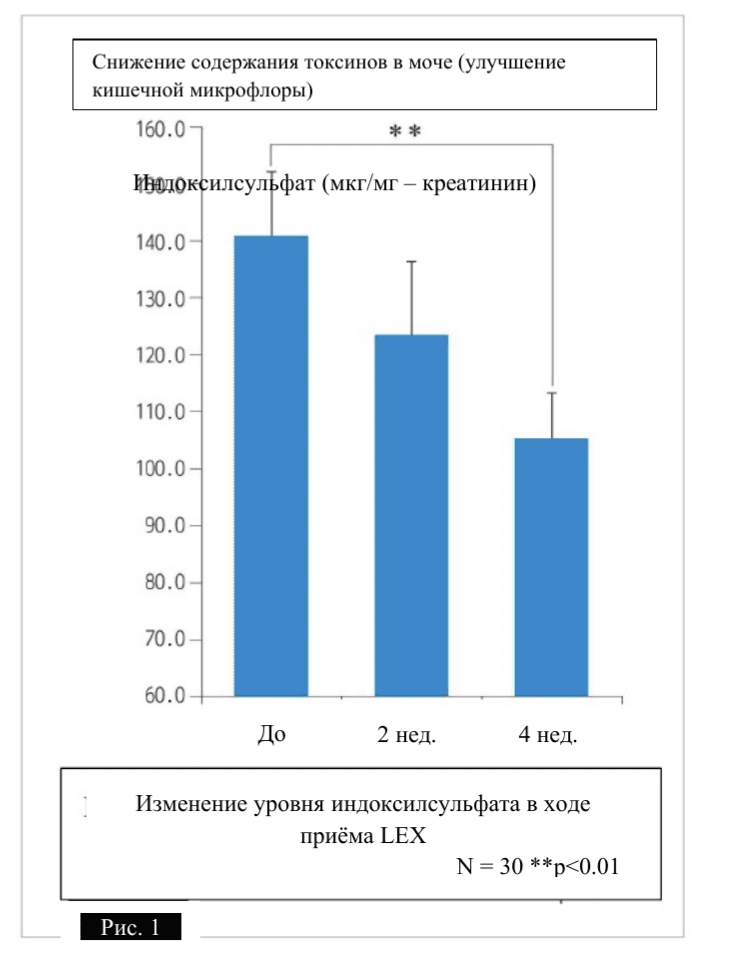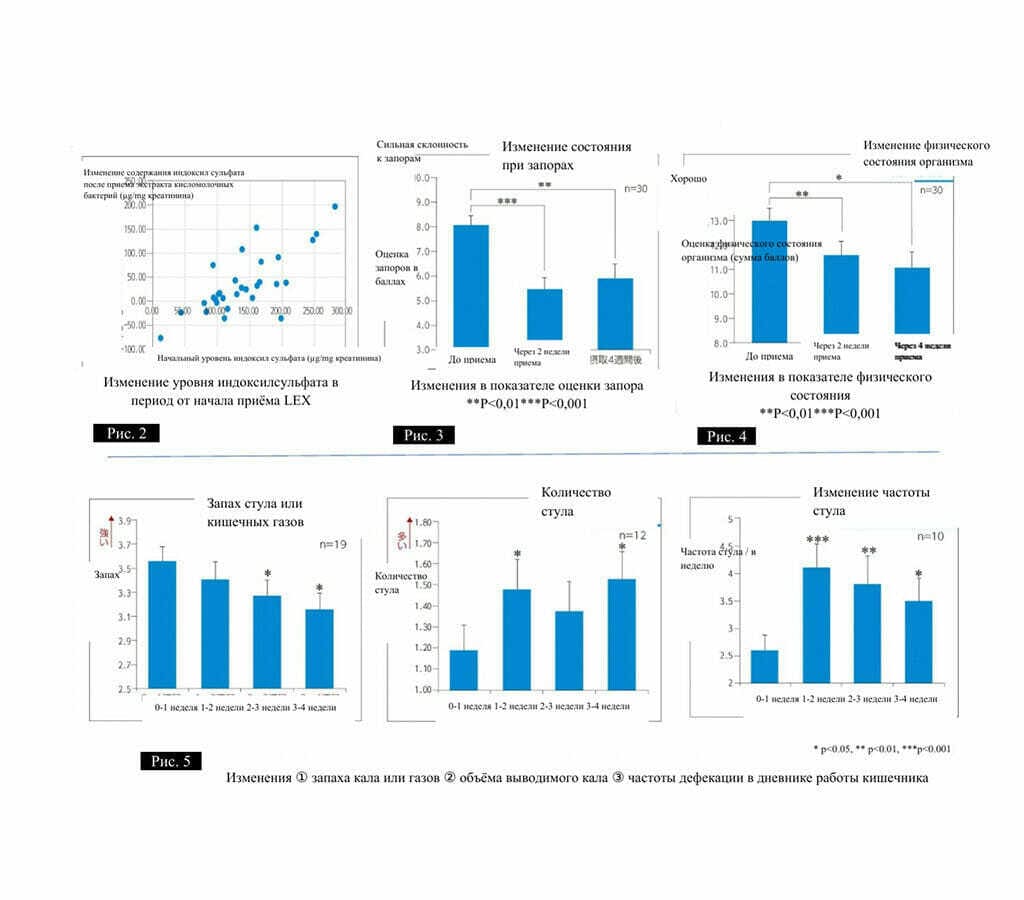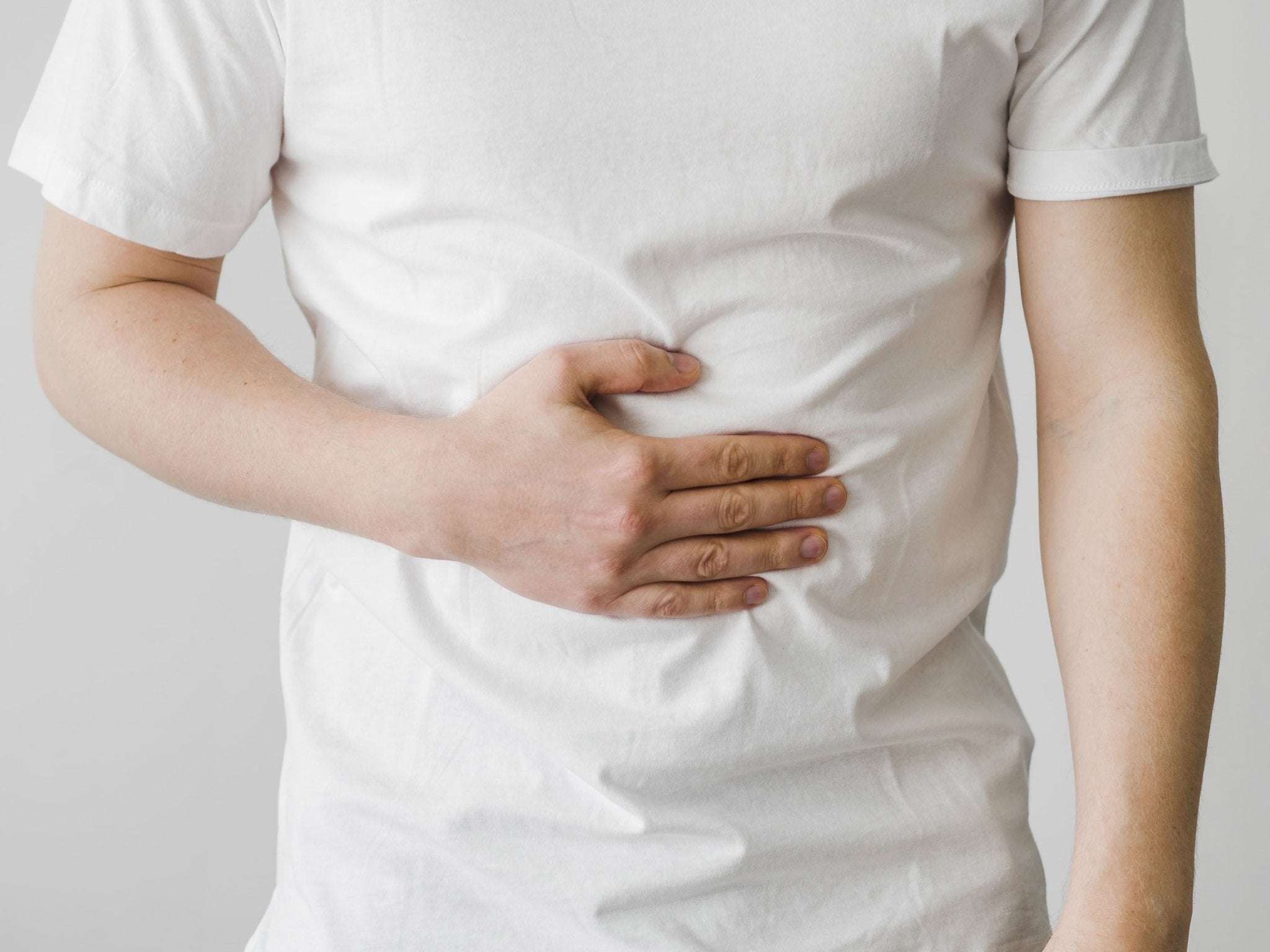Intestinal Microflora Research Report
It was confirmed that the extract fermented with lactic acid bacteria (LEX from the English Lactobacillus Fermentation Extract, trade mark "Daigo") significantly reduces the level of toxins in the urine (the level of indoxyl sulfate as an indicator of the state of the intestinal environment), reduces fermentation in the intestine, the frequency of constipation and improves the smell of intestinal gases, as well as it has a positive effect on well-being.
Koichiro Fujita
Distinguished Professor from Tokyo Medical and Dental University
Facts have been obtained confirming that as a result of consuming an extract fermented with Daigo *1 lactic acid bacteria for 2 weeks, fermentation in the intestine decreases, the likelihood of constipation and the smell of intestinal gases improves, and there is also a decrease in the level of the uremic toxin "indoxyl sulfate".
In the work with Dr. Koichiro Fujita, an honored professor from the Tokyo Medical and Dental University, it was confirmed that the extract fermented with lactic acid bacteria (LEX from the English Lactobacillus Fermentation Extract, trade mark "Daigo") significantly reduces the level of toxins in the urine (the level of indoxyl sulfate as an indicator of the state of the intestinal environment), reduces fermentation in the intestine, the frequency of constipation and improves the smell of intestinal gases, and also has a positive effect on well-being.
The results of the study were published in the scientific journal "Nutrition and Biologically Active Dietary Supplements", published in open access (issue dated December 23, 2020).
Description and purpose of the study
Most lacto- and bifidobacteria, which, according to scientists, improve the state of the intestinal environment, die even before they enter the intestine. Daigo consists not of living bacteria but of useful secretion products of 16 lactic acid bacteria and their microstructural components. This is an extract of fermentation of lactobacilli, derived as a result of our research of these microorganisms for 100 years. The production is patented.To date, it has been proven that the extract fermented with lactic acid bacteria (LEX) improves the content of the intestinal environment * 2 and activates intestinal immunity * 3, which is confirmed by studies on mice, and also eliminates and reduces colon polyps * 4, according to the results of studies involving humans.
Within the framework of this study, the positive effect of the extract fermented with lactic acid bacteria (LEX) on the condition of healthy people predisposed to constipation was studied; the level of indoxyl sulfate in urine was used as an indicator of a positive effect. Indoxyl sulfate is a uremic toxin secreted in significant amounts by bacteria in an unfavorable intestinal environment.

Results of the experiment
- The use of the extract fermented by lactic acid bacteria (LEX) for 2 weeks led to a gradual decrease in the level of indoxyl sulfate (toxin) in the urine as an indicator of the state of the intestinal environment, within 4 weeks вАУ to a significant decrease in the concentration of the toxin. The improvement of the intestinal environment is confirmed. [Figure 1]
- The condition of the study participants with a higher content of indoxyl sulfate in the urine initially (i.e., subjects with a more problematic intestinal environment) improved after taking LEX extract. [Figure 2]
- In addition, due to the use of the extract fermented with lactic acid bacteria (LEX), the indicators on the constipation assessment scale improved [Figure 3] and physical condition (improvements in indicators such as skin condition, sleep quality, waking up in the morning, etc.) after two weeks of intake [Figure 4].
Summary
The present study allowed us to establish that prolonged intake of the extract fermented with lactic acid bacteria (LEX) for more than 2 weeks had a positive effect on the condition of subjects aged 30 to 50 years, who had a high level of indoxyl sulfate (healthy people with a problematic intestinal environment and a tendency to constipation), improved the smell of feces and gases, the frequency of defecation and the volume of excreted feces, as well as the state of the intracellular environment (intracellular regulation).
Indoxyl sulfate is a toxic component secreted by several intestinal bacteria as a derivative of amino acids entering the body along with protein foods. It is assumed that prolonged intake of LEX extract affected microbial metabolism, causing a decrease in the concentration of uremic toxins. In addition, as a result of taking LEX, the subjects noted an increase in the quality of life against the background of relief of symptoms associated with a tendency to constipation and an improvement in physical condition.
Indoxyl sulfate is a toxic component secreted by several intestinal bacteria as a derivative of amino acids entering the body along with protein foods. It is assumed that prolonged intake of LEX extract affected microbial metabolism, causing a decrease in the concentration of uremic toxins. In addition, as a result of taking LEX, the subjects noted an increase in the quality of life against the background of relief of symptoms associated with a tendency to constipation and an improvement in physical condition.

Detailed description of the study content
Sixty women aged 30 to 50 years were screened before the start of the study, 30 of them were selected to participate in the study with elevated levels of indoxyl sulfate in the urine and a predisposition to constipation.For 4 weeks, the participants consumed lactic acid bacteria fermented extract (LEX) without interruptions
Product Name: Daigo, Dose: 10 ml/day
Measurements of the level of indoxyl sulfate in urine were made before the start of administration, two and four weeks after the start of administration. The survey collected data on abdominal symptoms and physical condition. In addition, participants filled out a diary of bowel work during the entire period of admission.
The results look like this:
Changes in the level of indoxyl sulfateBefore the start of taking LEX, indoxyl sulfate levels significantly exceeded the value of 141.0 ¬± 11.1 (mean value ¬± standard error of the mean value) mcg/mg of creatinine and the national average of 45.1 mcg/mg of creatinine. After the start of taking the product in the second week, there was a downward trend in the level, and in the fourth week, the level of indoxyl sulfate decreased significantly вАУ 105.3 ¬± 8.1 mcg/mg creatinine. In addition, a similar decline trend was more clearly observed in participants with higher levels of indoxyl sulfate.
Changes in symptoms of constipation
Constipation Assessment Scale (English: Constipation Assessment Scale, abbreviated CAS) is a tool for subjective assessment of constipation. Before taking LEX, the average value on the scale was 8.07 ¬± 0.39. In the second week of admission, this indicator changed significantly for the better, amounting to 5.47 ¬± 0.47. A similar trend continued in the fourth week (5.90 ¬± 0.59).Among other things, we analyzed information from the diaries of bowel work; we were able to find that in general, all subjects (n = 30) had no clear predisposition to constipation at that time, the frequency of defecation from the beginning of the study to the first week was 5.87 ¬± 2.71 acts of defecation/week. Thus, in this context, we analyzed only the data of those participants whose bowel movement frequency was вЙ•4 per week (n = 10), as a result of which we found a significant increase in the frequency of defecation in the period from the first to the second week compared with similar data in the first week of the study. In addition, participants who complained of a small number of feces per act of defecation (n = 12) showed a significant improvement in intestinal motility, and, according to their own assessment, the smell of feces and gases significantly improved in those who suffered from an unpleasant odor earlier (n=19).
Changes in physical condition
The assessment of the physical condition was carried out by the participants independently and included 6 items; the results of the self-assessment showed that taking LEX led to a significant improvement in indicators for all items in the period from the beginning of the study to the control points in two and four weeks after the start of the reception. The values have changed on all points, however, the self-assessment of the skin condition, the quality of sleep and waking up in the morning have changed most significantly.The component secreted by lactobacilli differs from live lactic acid bacteria. It is characterized by resistance to acids and high temperatures. In addition, according to confirmed data, the extract fermented with lactic acid bacteria (LEX) enters the intestine without harming gastric juice, allows you to establish a balance between different representatives of the intestinal microflora and promotes the growth of the population of intestinal bacteria in each person, as evidenced by an increase in the number of intestinal bacteria in the feces of subjects who took the supplement.
On the other hand, lacto- and bifidobacteria contained in yoghurts and fermented milk drinks on the market lose their viability under the active influence of gastric juice, so they are unlikely to be able to increase or diversify the population of intestinal bacteria.
